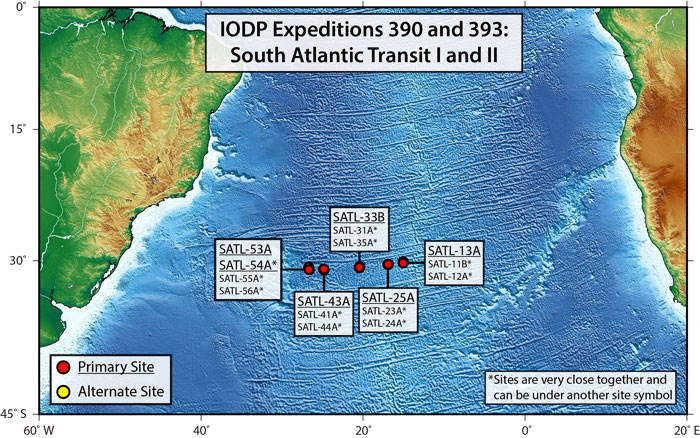
The IODP-China Office is calling for applications for the IODP Expeditions 390 & 393 (South Atlantic Transect) operated by the JOIDES Resolution.
South Atlantic Transect 1
Expedition 390 – 5 October to 5 December 2020
South Atlantic Transect 2
Expedition 393 – 6 April to 6 June 2021
South Atlantic Transect Expeditions 390 and 393 (based on IODP Proposals 853-Full2 and 853-Add) are a multidisciplinary and joint scientific ocean drilling project that aims to recover complete sedimentary sections and ~200 m of oceanic crust along a crustal age transect at ~31°S across the South Atlantic Ocean to
(1) investigate the history of low-temperature hydrothermal interactions between the aging ocean crust and the evolving South Atlantic Ocean; (2) quantify past hydrothermal contributions to global geochemical cycles; (3) investigate sediment and basement-hosted microbial community variation with substrate composition and age in the low energy South Atlantic Gyre subseafloor biosphere; and (4) investigate the responses of Atlantic Ocean circulation patterns and the Earth’s climate system to rapid climate change, including elevated CO2 during the Cenozoic.
The South Atlantic Transect expeditions will target six primary sites on 7, 15, 31, 48, and 63 Ma ocean crust. The proposed transect, which follows a Mid-Atlantic Ridge crustal flow-line, will fill critical gaps in our sampling of intact in-situ ocean crust with regards to crustal age, spreading rate, and sediment thickness. The transect traverses the previously unexplored sediment- and basalt-hosted deep biosphere beneath the South Atlantic gyre, samples of which are essential to refine global biomass estimates and investigate microbial ecosystems’ responses to variable conditions in a low energy gyre and aging ocean crust. The transect is located near World Ocean Circulation Experiment (WOCE) line A10, providing access to records of carbonate chemistry and deep-water mass properties across the western South Atlantic through key Cenozoic intervals of elevated atmospheric CO2 and rapid climate change. Reconstruction of the history of the deep western boundary current and deep-water formation in the Atlantic basins will yield crucial data to test hypotheses regarding the role of evolving thermohaline circulation patterns in climate change, and the effects of tectonic gateways and climate on ocean acidification.
For more information about the expedition science objectives and the JOIDES Resolution Expedition Schedule see http://iodp.tamu.edu/scienceops/ - this site includes links to individual expedition web pages with the original IODP proposal and expedition planning information.
Expertise sought:
Opportunities exist for researchers (including graduate students) in all shipboard specialties – including but not limited to sedimentologists, petrologists, micropaleontologists, paleomagnetists, petrophysicists, geophysicists, inorganic and organic geochemists, and microbiologists.
How to apply:
China-based scientists should apply through the IODP-China Office, Applicants must submit the application form (/Assets/userfiles/sys_eb538c1c-65ff-4e82-8e6a-a1ef01127fed/files/196_Application Form.doc), CV and post-expedition research plan (in English) to the IODP-China Office (iodp_china@tongji.edu.cn) no later than 1st August 2019.
For further details, please contact:
Dr. Shouting Tuo of the IODP-China Office
Tel.: +86-21-65982198, Fax: +86-21-65988808
Email: iodp_china@tongji.edu.cn
